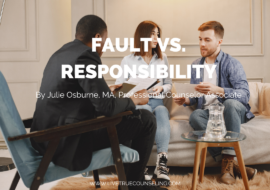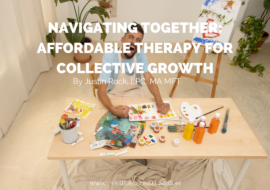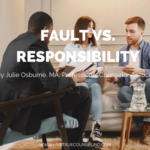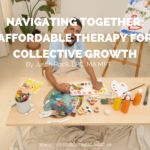When Loneliness Feels Overwhelming
Loneliness can feel so overwhelming. Even writing the word feels heavy and exhausting. It can feel heartbreaking when we need to reach out to others and find that there’s no one there. Or when we have something exciting happen and no one to share it with. When we feel this way, we often think that we’re the only one feeling this way. It may seem like everyone else has more friends or is better at romantic relationships. We may feel closed off and isolated from the rest of the world. And we may feel that our attempts to reach out to others will fail – so we don’t even try. Loneliness can feel debilitating.
Often others can’t see when we’re lonely. We don’t show them. As if feeling lonely weren’t bad enough, there’s a shame that comes with it. If others find out that we’re lonely, they make peg as us a “loser” who has no friends. So we hide it. And because we hide it, we don’t reach out to others for fear that we’ll be found out. And the loneliness cycle continues.
The Role of Social Media
Social media, of course, only makes this worse. Yes, social media can be a great place to connect with others. What better way to reconnect with your best friend from when you were young, who now lives on the other side of the country? But it can also feel isolating. We spend our time on our phones instead of connecting in person with others. Teens often spend their time playing video games and on their phones and are losing the ability to connect with others in person. Even when we are with others in person, we’re still often glued to our phones. There’s even a term for it now: “phubbing.” And yes, I’ll even admit that as I’m sitting here on my computer writing this, my partner is sitting at the other end of the couch on his phone scrolling through Facebook. We’re sitting on the same couch, yet we’re not connecting in any way. You can feel lonely even when there’s someone else in the room with you.
Not only does social media eat up the time that we used to spend connecting in person with others, but social media can make us feel like we’re missing out, which can make us feel even lonelier. On social media we see everyone else having fun with their large group of friends, eating the best food, being the best parents, and living their best lives. We look at our own lives in comparison and feel inadequate. Our brains don’t take the next step to realize that we’re not seeing others’ complete lives. We’re only seeing what they want us to see, which is the best of the best. And it makes us feel worse.
Why does Portland feel so lonely?
Portland in particular can be a very lonely place. It’s hard to make friends here. Really hard. Sure, it can be a friendly town at times, but overall it feels like everyone else has found their groups of friends and those groups are closed off to newcomers. A 2019 survey done by Seattle-based Pemco Insurance showed that a whopping 43% of Oregonians are simply not interested in making new friends. Instead of experiencing FOMO (fear of missing out), Oregonians experience JOMO (joy of missing out).
To make matters worse, native Oregonians pit themselves against anyone who didn’t grow up here and who doesn’t understand “what it used to be like here” (just look at the comments in the article about the Pemco survey). Anyone who is new to Portland has the cards already stacked against them. And with the advent of emerging adulthood, more people are moving into new cities. I’m not a native Oregonian, having moved here in my late 20s. I remember that after being here for about five years, a friend told me that I still hadn’t been here long enough to say that I’m “from Portland” when travelling to other cities. I still felt like an outsider. It’s not hard to see why this can feel like a very lonely city to live in.
Why is connection with others so important?
Despite the fact that many Oregonians report not being interested in making new friends, connecting with others is important to most of us. It’s in our DNA. Back in our cavepeople days, being part of the tribe was essential to our survival. Being a part of a larger community meant protection from outside threats like animals who wanted to eat us. It meant access to food and shelter. Our survival depended on being part of a larger group. Dr. Susan Bettis of William Temple House says that part of the reason that loneliness and depression are so prevalent today is that we’re “bad mammals” now (lecture, October 7, 2019). Now that we can access food, shelter, and protection from hungry animals on our own, we’ve retreated from our groups. Our DNA hasn’t caught up yet. Being isolated from our communities causes us distress because it goes against our biology. Loneliness is our brain’s way of telling us that being on our own isn’t good for our survival.
Introverts get lonely too
Some people think that because introverts can be exhausted by too much human interaction, that they don’t get lonely. That’s absolutely not the case. Introverts also crave connection, but that connection may look different than the connection that extroverts seek. In some ways, introverts have it harder. They may seek some connection, but too many people or too many interactions can quickly bring them to the edge of their comfort zone. Introverts may see people around them interacting and becoming friends while they struggle to start up a conversation with a single person. They may not feel comfortable in groups or with group activities unless they can find the other introvert in the group who also prefers one-on-one interactions. It can be harder for introverts to do something about their loneliness.
How can we stop feeling so lonely?
One way to combat loneliness is to reach out to others. I know, it’s hard. It can feel too hard. To reach out to others, you have to put yourself out there. You may have to risk feeling shame and embarrassment. It’s difficult, but it’s also possible. But how does one even go about meeting people?
Luckily for Portlanders, someone somewhere knew that loneliness is something felt by others too and decided to do something about it. Portland has a Meetup for just about anything you can imagine. (There are even a few for introverts.) Portland is also full of book clubs, D&D groups, live music shows, and classes where one can learn cooking, how to brew beer, or a myriad of other things. These are places where others go too, with the express purpose of meeting other people and taking part in the community. If you attend a meetup or a group whose members share your interests, you’re already one big step in. Finding folks to connect with is a lot easier when you have something in common.
The importance of Deep Talk
You might find that you’re not sure what to say to the new person you’ve just met and they’re not sure what to say to you either. Having something in common is a great start, but it’s not always enough when you’re getting to know someone. In her book, Sorry I’m Late, I Didn’t Want to Come, Jessica Pan talks about learning the difference between Surface Talk (talking about what you did that day or the weather or how your commute was) and Deep Talk (talking about what those things mean to you and how you feel about them). We often stay on the surface with others because we think we’re being too nosy or invading their privacy if we ask Deep questions. Jessica Pan found that most people crave Deep Talk. Deep Talk truly connects us to others. It doesn’t just allow us to tell our stories – it’s essential that we tell our own stories. Deep Talk has to be a two-way street though. Both parties have to engage. Deep Talk can be very hard to do, because it often means making yourself vulnerable. It can mean sharing stories of your own loneliness. When engaging in Deep Talk, someone has to go first. And, not knowing if the other person is willing to go there with you (especially when meeting someone new), it can feel like a big risk.
I’ve practiced this in my own life recently. Being a therapist can be a very isolating profession and so I’ve been reaching out to therapists (many whom I don’t know at all) and asking them to coffee. Most have been very accommodating and welcoming, but since I put out the invitation, they look to me to guide the conversation. Here I have a choice. I can choose to ask them the Surface questions – how long they have been practicing, what they specialize in, where they went to grad school – or I can choose to ask them Deep questions – what it was like when they first started out, what their fears were as a new therapist, whether they experienced Imposter Syndrome when starting out. Because I want to connect with them, I’m choosing Deep Talk. And it means that I often have to go first and share my own journey. What I’ve found so far is that every one of them is also then willing to open up to me. We don’t just meet for coffee. We start to really get to know each other.
Deep Talk can be difficult – especially for men
Sometimes it can be hard to engage in Deep Talk not just because we have to be vulnerable with another person, but also because we don’t want to be known as the “serious one” or the one who talks about heavy issues all of the time. It’s important to read others’ reactions when you’re attempting to engage in Deep Talk. If they’re not there with you, it may backfire. And sometimes chatting about a sports game or what the cat did that morning is enough for the moment. You don’t have to go Deep all of the time.
Deep Talk can also be difficult for men. While I believe that men and women (and those who identify as both or neither) have more in common than not, the reality of our society is that boys are socialized differently than girls. Boys are taught that one emotion is okay to express – anger. (I’m generalizing here; not all boys grow up this way.) They learn to turn off or suppress their other emotions. This doesn’t change when they become men. There are some not very nice words in our society for men who do show vulnerability and a range of emotions. Men pay the price for expressing sadness and loneliness. They are made to feel weak (when actually vulnerability is a strength and an act of bravery, but that’s another blog post). Men may crave Deep Talk as much as women, but they may not feel permission to participate in Deep Talk, especially with each other. It’s important to be sensitive to this when trying to engage in Deep Talk with a man, especially if you’re also a man. It then makes sense that men may feel lonelier than women – or may be stuck feeling lonely longer than women do.
Therapy can help
Therapy can provide a safe space to engage in Deep Talk and to practice skills that include reaching out to others and having conversations that you initiate. It can also help you explore your loneliness and be reminded that others experience it too. Therapy can help you understand the role that loneliness plays in your life and help you explore your options to live with it or alleviate it. Talking to a therapist can be a great way to reach out and start connecting with others.
References/Further Reading
Herron, E. (2019, May 29). Oregonians Don’t Want to Make New Friends, Survey Says. Retrieved October 20, 2019, from https://www.wweek.com/news/2019/05/29/oregonians-dont-want-to-make-new-friends-survey-says/.
O’Neill, M. (2018, March 27). Staying glued to your phone causes others to feel they don’t belong. Retrieved October 20, 2019, from https://www.dailymail.co.uk/sciencetech/article-5547079/Are-phubbing-friends-Staying-glued-phone-causes-feel-dont-belong.html.
Pan, J. (2019). Sorry I’m Late, I Didn’t Want to Come: One Introvert’s Year of Saying Yes. Andrews McMeel Publishing.
Jenny Larson loves her work as a therapist at Live True Counseling and as a Volunteer Counselor at William Temple House. When not seeing clients, she can be found reading psychology books and celebrity memoirs, watching bad (good) 80s movies, and sewing or baking. While self-identified as a cat person, she also has a fondness for dogs and other animals.









